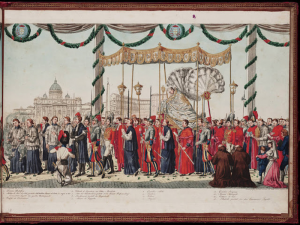Corpus Christi
 Till the thirteenth century the Church had not thought of establishing a special festival in honor of the Blessed Sacrament, being satisfied with celebrating on Holy Thursday the institution of this divine mystery. At that period, however, as heretics dared to attack the Real Presence of Jesus Christ in the Eucharist, and numerous miracles and special revelations had occurred to concentrate the attention of the Christian world on this dogma, Pope Urban IV decreed, in 1244, that a special feast should be instituted, which, by its solemnity and pomp, should be as a protestation in favor of the unwavering faith of the Church, and should, at the same time, offer an honorable reparation for the blasphemies of impious men.
Till the thirteenth century the Church had not thought of establishing a special festival in honor of the Blessed Sacrament, being satisfied with celebrating on Holy Thursday the institution of this divine mystery. At that period, however, as heretics dared to attack the Real Presence of Jesus Christ in the Eucharist, and numerous miracles and special revelations had occurred to concentrate the attention of the Christian world on this dogma, Pope Urban IV decreed, in 1244, that a special feast should be instituted, which, by its solemnity and pomp, should be as a protestation in favor of the unwavering faith of the Church, and should, at the same time, offer an honorable reparation for the blasphemies of impious men.
But this pontiff happening to die soon after, the Bull had not all the effect intended, and it was only after the Council of Vienne, held in 1332, that the feast of the Blessed Sacrament, or Corpus Christi, was definitively established throughout the Catholic world. The Holy Council of Trent newly approved in a formal and earnest manner both the worship itself and its attendant pomp.
The Feast of Corpus Christi is then a solemn act of faith in the Real Presence of Jesus Christ in the Blessed Eucharist; and this belief, to which the Church attaches an importance of the highest moment, is the very groundwork of Catholicity, or rather is the very essence of all Christianity. For if Jesus Christ be not present really and corporeally under the elements of bread and wine, as He has Himself formally told us, His word is no longer reliable. He is no longer God, and there remains of religion naught save a beautiful but sterile philosophy, which each one can remodel after his own mind.
If it be allowable, as Protestants contend, to interpret, in a purely allegorical sense, words of such clearness that there are not, throughout the whole of the Gospel, any more positive or precise, it is permissible to interpret every thing at will, and the Gospel remains an enigma, the solution whereof is nowhere to be found. It is furthermore the intention of the Church to make an avowal of her love and gratitude to Jesus Christ, and to offer reparation for all the profanations and sacrileges to which this adorable sacrament has been exposed.
Reflection – O weak-hearted and lukewarm Christians! O ye infidels, unbelievers, and heretics of all ages! “If you did but know the gift of God, you would perhaps have asked of Him, and He would have given you living water!”

